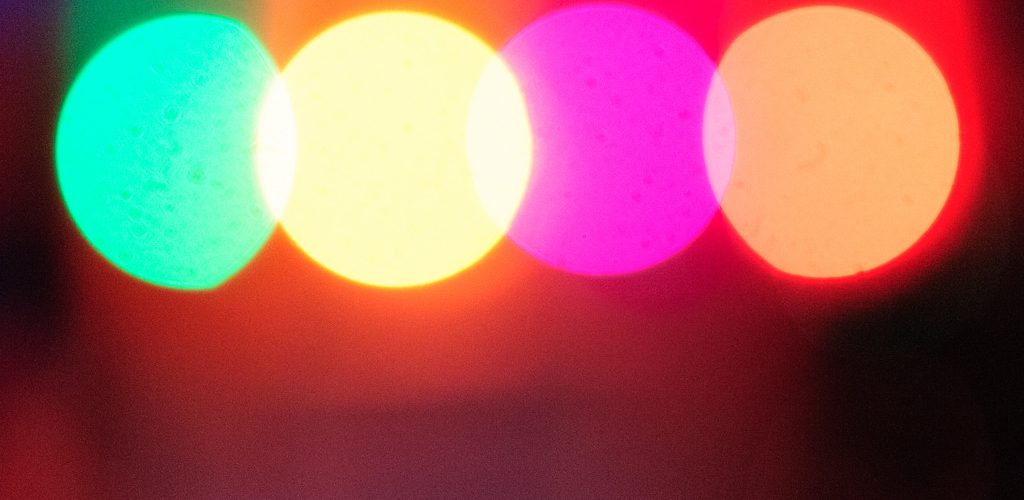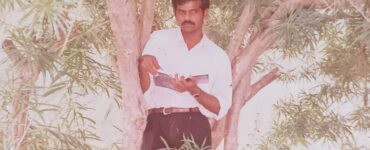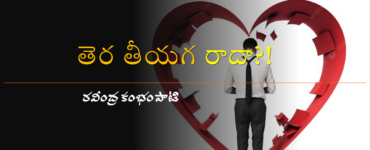The golden mountain
(Original Telugu title: bangaaru konDa – బంగారు కొండ)
Sipping the light and the dark,
Nibbling the shadows bit by bit,
Defying even the savage storms,
Stands up the mountain – firm and fearless.
It is a silent witness,
Be it in glee or grief,
To everything happening before its eye.
Dig it, or chisel it, or cleave it;
Or carve it into temples or deities;
Or even blast it into nothingness;
Yet stays the alp – on a vow of silence.
Neither knowing nor keen to know
How much wealth
Lies within it and without –
Like an ascetic it persists.
Even when the watery wench
Flows past – slapdash,
Cockily, mockingly and coquettishly
To run into the arms of the far off sea –
The mountain stays unswayed – like a Buddha.
Giving away everything of it
Or ready to give away
It has abided in quiet meditation
For centuries on end
Like an ageless epitome of love;
Like a Sufi lost in divine ecstasy.
The mammonized trees
(Original Telugu title: dhanaakarshaka cheTlu – ధనాకర్షక చెట్లు)
Noticing the humans
And ominously shaken
By the violence in store
They shrink into their own shadows
And turn into a hapless witness
To the inhuman havoc
And endless savagery
Going to strike at some midnight hour.
It is only the birds over there
Scattered by the impending menace
That break through the gloom
And squeak and squall –
To broadcast their protest.
Wherefrom a path comes
And where it leads to –
The forest misleads even those
Who know it very well.
Unseen by anyone
The trees sneak away overnight
As trunks or logs
And cross not only the forest
But even cities and countries,
If lucky.
Falling into the hands of the police –
The smuggled woods,
Suffering for no guilt of theirs –
Caress each other’s bare wounds
And console one another –
While awaiting their sale
In the marketplace.
The charm of the ocean
(Original Telugu title: samudraakarshaNa – సముద్రాకర్షణ)
Drinking in the rivers,
Touching the walls of the skies,
Unconscious of birth and death,
Unaware of depth and support –
It’s the thick mirror of water
That is the ocean.
It’s the womb –
Of a variety of fishes and sea-lions;
An inexhaustible trove of treasures.
Explore it deep and deep,
And it looks like a lamp in an airless place
In its wave-less calmness.
The deep breath of its billows
Turns into a tongue-less tune
Firing up an infinite, feisty dance.
Each surge has in its tow
Waves and waves of followers
Moving on submissively
And breaking off on the shore –
Marching on like an army
And wreaking a devastation.
How impatient is the ocean!
To kiss the coast!
Or to see the people from close quarters!
“Do these belong to you?” –
Saying so, the breakers discharge the debris
On the shore, and then return home.
Day after day,
Dips and floats charmingly and cheerfully –
The rising and setting sun.
Dreaming the turmoils,
Staggering and reeling like a drunkard,
And never allowing any sound sleep –
Are the ships fading from view.
Though invisible in the foggy gleam of the search light,
The frolics of the high and low tides with the moon –
Do come alive audible.
Like how the fish reads the water
And the palate knows the taste of salt
So do exist the challenging seas,
The trans-oceanic tranquilities,
And the entire worlds of life –
In the mystery of creation.
Are there no answers?
(Original title: zawaabulu laevaa – జవాబులు లేవా)
Is poetry like a camera?
Whoever snaps any number of photos –
They are all different.
If we close the lids of our eyes
The windows of the dreams readily open.
Do the dreams come and go at a lightning speed?
No tree can grow up in the city like in a forest
Don’t they know there is a limitation in the city?
The entire timber making up our houses
Comes from what was once a forest.
How many woody pieces of flesh
Must have made this timber?
How many ancestors must have added
To the foundation of this world?
Which is the language of silence?
Which is the colour of the wind?
Does the river know its own bed?
Does the spider know how its web takes shape?
Does the canvas know of the picture on its face?
And does any living being know of its last breath?
For the Telugu poems see the original writer’s poetry collection:
రాత్రి నదిలో ఒంటరిగా (raatri nadiloe onTarigaa), Dec 2017,
Palapitta Books, Hyderabad – 500 044.
Email: palapittabooks@gmail.com
Y Mukunda Rama Rao
Translated from Telugu by: U Atreya Sarma
Photo by EJP Photo on Foter.com / CC BY-NC-SA









Add comment